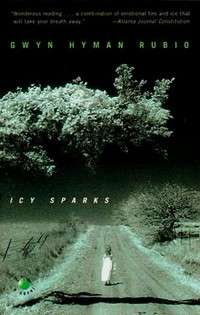Icy Sparks
 | |
| Author | Gwyn Hyman Rubio |
|---|---|
| Country | United States |
| Language | English |
| Genre | Novels |
| Publisher | Viking Press, Penguin Books |
Publication date | 1998 |
| Media type | Print (hardback & paperback) |
| Pages | 320 pp (first edition, hardback) |
| ISBN | 0-670-87311-X (first edition, hardback) |
| OCLC | 38353446 |
| 813/.54 21 | |
| LC Class | PS3568.U295 I25 1998 |
Icy Sparks is a novel by Gwyn Hyman Rubio. It was chosen as an Oprah's Book Club selection.
Plot
The story concerns a girl struggling with accusations of Tourette's syndrome and Tourette's and with selective mutes.
Icy Sparks is a girl living in Eastern Kentucky with her grandparents in the 1950s/1960s. She doesn't get along well with her peers and suddenly starts having tics and croaks. Icy goes down into the root cellar to let out her tics, hiding the condition from her grandparents. Finally she tells her friend, Miss Emily Tanner, a local store owner who is also an outcast from society at 300 pounds. Her teacher tries putting her in a solitary classroom but even that doesn't work. Her grandparents have Icy admitted to a mental institution for observation.
Even in the institution, Icy is an outcast. She sees herself as not as mentally ill as her peers there and is tormented by one of the hospital workers. She befriends a second worker, but really just wants to go home. When she is allowed to, she stays in her house or on the surrounding property and does not venture out in public.
After her return home, the atmosphere is tense. After her grandfather dies, Icy and her grandmother turn to religion for solace. Inspired by a tent-meeting revival where she observes that people touched by the Holy Spirit behave as if they have Tourette's syndrome, Icy discovers she has a gift for music. She proceeds to attend university, where her disorder is diagnosed officially. Later, she becomes a therapist, working with children with Tourette's syndrome and with selective mutes.
Awards and nominations
Icy Sparks was chosen as an Oprah's Book Club Selection in March 2001.